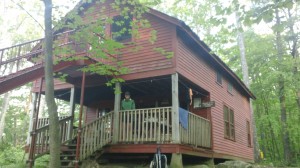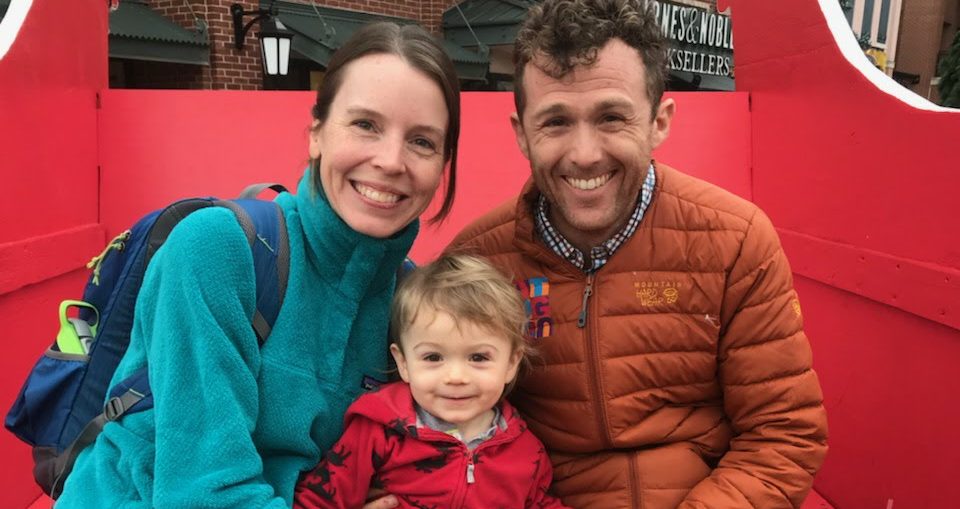
Upper Goose Cabin in MA on the AT. This was luxury complete with bunk beds, mattresses, and coffee and pancakes in the morning.
Two weeks ago, we left our tent in Greenwood Lake, NY and have since been shelter hopping for our nightly residence. So far, so good, yet so different.
I am so intrigued by how the presence of shelters shapes the AT experience. Since there were so few on the PCT (I can only think of 2, though there may have been more), the shelter life still seems so new to me. And since we had a tent for the first 8 weeks of the trail, we rarely slept in the shelters, so these past 2 weeks have been an experiment in really living the shelter life.
When we began the no-tent experiment, we knew that we’d have to be prepared to arrive at a full shelter, with the options of hiking on to the next shelter with hope of room there, or cowboy camping near the shelter. Cowboy camping is just sleeping outside with no tent, tarp or covering to keep out the bugs and critters. It’s definitely my least favorite option, yet hiking more miles at the end of the day also seems awful. Optimist and I aim to put in a full day of walking, so by the time we arrive around 7pm, we’re usually the last to arrive, which lowers our odds of space being available. Thankfully, every shelter that we’ve arrived at has had room. There is always a sigh of relief as we walk up to a shelter and see open space on the wooden floor, and we claim our space quickly in case anyone else arrives after us.
Only staying in shelters has changed a few things about the hike. Our mileage has been determined by the shelters, so last week, when we had a choice between 21 miles and 35, we chose the latter and had quite a full day of walking. It ended up being completely worth the miles, as the next morning, the caretaker of the shelter (this was a special cabin shelter, so sort of rare) made us pancakes and coffee. I’ve also had to be more social than I’d like. When I arrive at camp, I rarely want to do introductions and find out much about the other hikers. Optimist is so much more social and patient in sharing his energy with meeting strangers, and when we had a tent, I could leave that part to him. Now that I actually have to stay in the shelter, it’s a bit different. I just like to get changed, eat dinner and get in my sleeping bag. I can’t do that as much when I enter a shelter full of people, as it’s understandable that people like to find out a little bit about you before they share a sleeping platform with you. Thanks to a trail angel in Kent, CT, Mama Lipton, I now have a pair of ear plugs, which have been my best 1 ounce friend, as nearly everyone snores. I can’t hear a thing when they are in, which blocks out all the snoring hikers and any squeaking mice that may be looking for crumbs.
Lastly, the shelter life has changed our experience as a couple. Not that sex on the trail was exactly kept near the “normal life” average when we had a tent, but it was certainly easier. Our rain fly kept us from being seen by anyone, so it was at least private. Though the lack of cleanliness lowered the frequency in a tent, it was always an option for us. Now that it’s all shelters shared with others, sex on the trail is basically non-existent. We hadn’t showered for these past two weeks, and hadn’t done laundry for nearly a month, so it’s not that the desire was even there since our bodies and clothing were so disgustingly dirty. Even with those deterrents, we still would have kept up some kind of average had we been in a tent.
Now that we are on vacation, we are heading past Greenwood Lake to pick up our tent and all the others things we left behind. We have the option of carrying the tent again for the last few weeks on the trail, which would be nice to have, yet we’ll have to deal with the extra weight once again. We’re not sure what we’ll do just yet, but we’ll certainly weigh the pros and cons before we decide what to do before getting back on the trail to either continue living the shelter life or just observing it.


